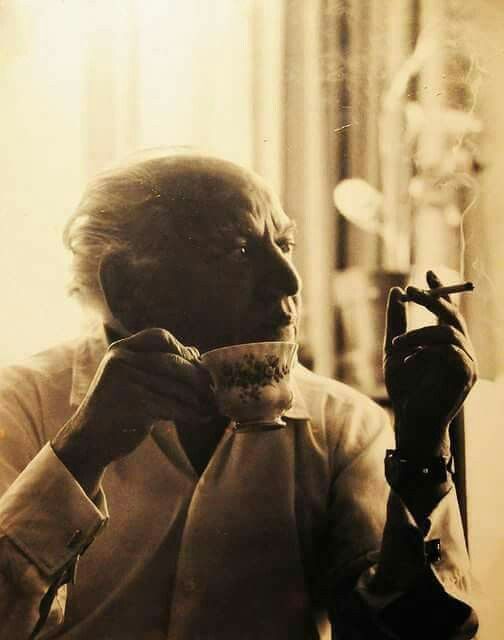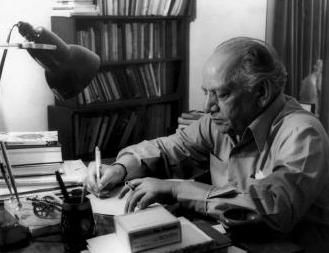It was somewhere around 2008, when I was into revolutionary poetry. I was learning to understand the fact that there is no such thing as a good political party. One has to always be a critique of the regime, so that the government is not left unchecked. I would learn from various protest songs through my elder brother, and it was during this phase that I learnt of Faiz Ahmad ‘Faiz’, the revolutionary poet of Pakistan whose ‘Hum Dekhenge’ (We Shall See) and ‘Bol Ki Lab Azaad Hain Tere’ (Speak for your lips are free) became an inseparable part of my playlist. I would listen to different renditions of these songs and would try to sing them as well. The songs filled me with hope and courage, and I penned several mediocre poems inspired by these.
I was amazed by the powerful choice of words by Faiz Sahab, and would tell about him to my friends in school, who unfortunately had no interest in Urdu literature. Even though I was so head over heels for the poet, I was really naive to limit him to revolutionary poems. It was just a part of his personality.
Cut to nearly a decade later, I started making more and more Pakistani friends on social media of course, and most of them turned out to be literature lovers. When I saw these people sharing the same love for Faiz as me, my love for the poet only grew, and I realized that I needed to read more and more about him. With every new poem of his that I read, I wanted to read him more and more to get a grasp of the man whose poetry captured varying emotions.

I will not claim that I have researched Faiz’s works, because I haven’t. I read them as per my taste and curiosity. But I learned that there are books that cover different personalities of the man and thus the curiosity grew. I used to read poets who would criticize romantic poems in favour of revolutionary ones, calling the former absurd, especially in the times of crisis. Faiz defied this logic many times. One of the best examples of this is the famous poem of his which is one of those remembered by non-readers as well, because of the famous renditions:
Gulon mein rang bhare, baad-e-nau bahaar chale,
Chale bhi aao ki gulshan ka kaarobaar chale.
(That the flowers may blossom, and the breeze of early spring may flow,
Come so that the garden may be back to its business)
Faiz wrote this poem, which has more couplets that follow, in Montgomery Jail in 1954. His poems ranged from being a song of a lovelorn waiting for his beloved, or someone remembering his lost love, to a song of someone who is concerned for the nation, or wants liberation from the life of humiliation, or someone who feels for the downtrodden, marginalised sections of the society. His excellence in covering these emotions with the same finesse and passion is what makes him stand apart from many other poets.
I can’t help but present some examples of different personalities of Faiz reflected in his words, credits to his dramatic life that went through several interesting phases:
Kar raha tha gham-e-jahaan ka hisaab,
Aaj tum yaad behisaab aaye.
(I was counting the pains of the world,
I remembered you today without measure)
Faiz is clearly romantic here, remembering the lost love and somewhere waiting for her to be reunited with him. This emotion of union is expressed in these lines:
Ik tarz-e-taghaful hai so wo unko mubarak,
Ik arz-e-tamanna hai so hum karte rahenge.
(That style of ignoring is what she’s blessed with,
This expression of desire is what I will go on with)
Faiz vehemently became a voice for the underprivileged sections, the poor, the women of the society, which is evident in these lines:
Zindagi kya kisi muflis ki qaba hai jisme
Har ghadi dard ke paivand lage jaate hain
(Is life a garment of a pauper in which
Every moment a patch of affliction is attached?)
This same Faiz fearlessly stood against the oppressor, especially against the dictator Zia-ul-Haq, and had to face prisons several times. He was exiled as well, and his poems, banned. Once, he was being taken through market with his feet chained, to a dentist’s office. He wrote a powerful poem on the same. The opening lines of that poem are:
Chashm-nam jaan-e-shoreeda kaafi nahin,
Tohmat-e-ishq-e-posheeda kaafi nahin,
Aaj bazaar mein paa-ba-jaulan chalo,
Dast-afshan chalo, mast-o-raqsan chalo.
(Wet eyes, frenzied life isn’t enough,
The accusation of hidden love isn’t enough,
Walk in the market today, with the feet bound,
With stars in the hands, and you, drunk and dancing.)
Faiz suffered a huge blow when the Partition saw a large-scale massacre on both sides. He wrote a poem called Subh-e-Azaadi (The Morning of Freedom) to express the pain. The opening lines are:
Ye daagh daagh ujaala, ye shab-gazeeda sehar,
Wo intezaar tha jiska, ye wo sehar toh nahin.
(This freckled light, this morning, hurt by night,
That which we longed for, this isn’t that morning.)
The thing with Faiz Ahmad ‘Faiz’ is, that although his poems contain words that one may have never read before, there is something really attractive about them that draws the reader to know the word, to know the emotions that went behind the poems. These words are arranged in such a way that they rhyme, and when they don’t, they create a musical effect, which is something that resonates with every soul. His revolutionary words call you to stand up against oppression and fill you with hope and courage. At times, they complain of the system as well, thus causing discomfort to those who feel they are in control of the masses. When he writes on love, he may seem to mock the lover by telling her there are things more important than love, while also telling her his grievances and thus loving her every moment. He longs for her and sees hope in the longing. You can’t simply be the same person anymore after reading his poetry.

I had to skip a lot of his famous poems while writing this piece to celebrate the magnificence that Faiz was. While no amount of words can do justice to this man who will live forever in our hearts, I felt it was kind of important to give an introduction to the personality whose words have a great influence on my writings, something which I realized only some weeks ago. I was fortunate enough to be introduced to such people who helped me in learning Faiz a lot better. The journey is still on, and while I want to many of his poems by heart, the knowledge that there are many, many poems by the legend that I still have to read for the very first time brings me great joy.
I can only hope that the man who shook the authorities with his hopeful and courageous ‘Hum Dekhenge’ recently in India as well is read and understood more widely than before. Faiz is a treasure, not just for his fans in Pakistan and India, but for everyone who not only sees the world, but also feels every emotion it has to present, slightly more than others.
Closing with this couplet from Faiz:
Unhi ke faiz se bazaar-e-aql raushan hai,
Jo gaah gaah junoon ikhtiyaar karte rahe.
(It’s by their grace that market of wisdom is blooming,
Those who sometimes kept possessing madness.)
– Shahrukh Jamal